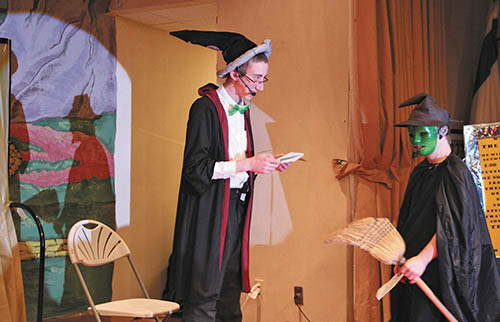
This article is modified from a speech introducing the SINAI Shalem boys’ performance of The Wizard of Oz on April 12, 2016. The students began preparation for the show in September, and spent months leading up to the single performance for their friends and family.
One of our famous mantras here at SINAI Shalem High School is the phrase, “It’s not about cutting bread.” These are 5 simple, comprehensible words that mean so much more. To us, they represent the philosophy by which we design every learning experience. It is about process, not product.
So where does this phrase come from? The students at SINAI Shalem have intellectual or cognitive disabilities, and a major component of our curriculum is “Voc,” or vocational training, to give them skills they can use as they enter adult life. For many years, one of our beloved vocational sites, Yavneh Academy’s cafeteria led by Terri Infield, has afforded some of our students the opportunity to grow in vocational independence. The students were frequently expected to carefully cut large loaves of bread into small pieces, to be distributed to the young preschool children in order to have something on which to say Hamotzi at lunch time. Our students worked diligently as they cut. They held the knife safely, cut the bread evenly and put it into bags. It was all about the bread.
And yet, every September when I introduce our vocational program to new teachers and job coaches, I always am sure to say that phrase, “It’s not about cutting bread.” What I mean is that the goal of what we call “Voc” is not only to learn how to do the individual task at hand, but how to be a worker. To learn the process, the skills, the intricacies. To learn how to wait, transition to other tasks, interrupt appropriately, problem solve, remain focused and so much more. These are the skills you need for life, and for most any job.
In today’s world, we are all used to immediacy. We expect information to be at our fingertips. How often do we text someone a simple question, and then grow impatient during the 30-second wait for a reply? We can’t even wait 30 seconds! We watch competing advertisements for Verizon Fios, Cablevision, Optimum, all boasting the fastest Internet service—as though our world will fall apart if we have to wait eight more seconds to get online…and yet it feels as though it does. Think about the feeling that builds up inside when you are the second car behind a red light. As soon as that light changes you expect the car in front of you to fly through. But oh, it took the driver two extra seconds longer than you to notice that the light changed. By then you are already honking your horn. Two seconds. But you couldn’t wait.
In a world where virtually everything we need is at our fingertips instantly, it is hard to focus on anything but the product. If we look into the Torah, we can find many examples of events or experiences that could have been instantaneous…only they weren’t. Hashem could have created the entire world in one day, or even one minute. But He chose to take six days. Noah took 120 years to build the Ark. Surely it could have been done faster. But in truth, we would never be able to appreciate the magnificent prize we call Shabbos if we didn’t have to work all week leading up to it. We wouldn’t need the product we call Shabbos without the process of work. With Noah too, Hashem had a plan. He wanted the people of his generation to notice, to ask, to reflect, to repent. He wanted the process of building the boat to be instrumental in impacting this generation. Again, a process. There are so many more examples. The years of enslavement in Egypt, the 40 days and nights waiting for Matan Torah, the years in the desert, and so on and so forth. The common denominator is that each experience was about process. It is about the lessons, the interacting, the teaching, the guiding, the mistakes made along the way…it is all part of the process, and all more valuable than if we were to take the fast pass and jump to the front of the line.
That’s why here at SINAI Shalem, whenever someone gets too caught up in the end product, he or she is sure to hear that phrase, “It’s not about cutting bread.” It really isn’t about the end product—the small pieces of bread—but rather, about the process. The experience of working towards a goal, and the journey packed with lessons and skill building along the way, by all accounts outweighs the destination. The journey is what will teach our students to learn how to listen, to guide a friend, to problem solve, to be flexible, to overcome anxiety, to be patient. These are skills we use every day. These are skills that we continue to perfect, and continue to shape, as we become the people we are supposed to be, no matter who we are.
It is the process, not the product.
Esther Klavan is the Director of SINAI Schools’ Karasick Shalem High School at Torah Academy of Bergen County. SINAI operates several inclusive special education schools throughout northern New Jersey for Jewish children Grades 1–12, and provides services for adults with developmental disabilities. For additional interesting articles on special education, visit the SINAI blog at www.sinaischools.org/blog.
By Esther Klavan











